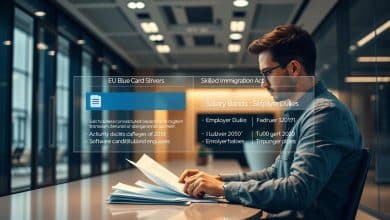Los Angeles Marriage Visa & Sponsorship: Everything Applicants Should Know
Navigating the path to permanent residency through family ties can feel overwhelming.
This guide simplifies the steps for couples seeking to build their lives together in the U.S., focusing on legal requirements and practical strategies.
Every year, thousands of partners secure lawful status through family-based petitions. The system prioritizes genuine relationships but demands thorough documentation. Applicants often face challenges like extended processing times or requests for additional evidence.
Preparation starts with understanding two main pathways: adjusting status within the country or completing consular processing abroad. Both routes require proof of a bona fide union, financial stability, and adherence to federal guidelines. Many find success by organizing paperwork early and anticipating interview questions about their shared life.
Key considerations include processing fees, medical examinations, and potential language barriers. Partners from Nigeria should pay special attention to cultural nuances when explaining relationship timelines or family traditions during interviews.
This resource breaks down each phase, from initial petitions to final approvals. It addresses common hurdles while offering actionable advice to strengthen applications. With proper guidance, couples can confidently move toward securing their future in America.
Understanding Marriage Visas & Visa Sponsorship in Los Angeles
Legal recognition of partnerships forms the backbone of spousal immigration. Couples must meet specific criteria to qualify for family reunification programs. The system balances compassion with strict legal standards to prevent fraud while keeping families together.
Defining a Valid Marriage for Immigration
A legally binding union requires formal registration in the jurisdiction where it occurred. Common-law partnerships gain recognition only if valid under the originating country’s laws. For example, Nigerian customary marriages often qualify when properly documented through certificates or sworn affidavits.
Polygamous unions face unique restrictions. Federal guidelines acknowledge only the first spouse in such arrangements. Immigration officers scrutinize relationship timelines through bank statements, lease agreements, and communication records to confirm authenticity.
Overview of the U.S. Immigration Process
Family-based petitions typically follow three phases: initial application, evidence review, and final approval. Over 60% of annual green card allocations go to spouses and immediate relatives. Successful applicants demonstrate financial stability through tax returns and employment records.
Cultural considerations matter during interviews. Nigerian couples should prepare to explain traditions like bride price payments or extended family dynamics. Proper documentation of ceremonies and shared responsibilities strengthens cases significantly.
Eligibility Requirements for U.S. Sponsors
Sponsors play a critical role in family-based immigration processes. To qualify, individuals must meet specific legal standards that ensure they can responsibly support their partner’s transition to the United States.
Minimum Age and Residency Requirements
While there’s no minimum age to start the petition process, sponsors must be 18 or older when signing the Affidavit of Support. This document confirms financial responsibility for the sponsored spouse. U.S. citizens and lawful permanent residents can initiate the process, provided they maintain valid immigration status.
Maintaining U.S. Domicile
Sponsors must prove their primary residence remains in the United States. Those living abroad temporarily must show concrete plans to return, like job offers or property ownership records. Example: A sponsor working in Nigeria might submit lease agreements for a U.S. home or school enrollment forms for dependent children.
The Affidavit of Support creates a binding financial contract. Sponsors must demonstrate income exceeding 125% of federal poverty guidelines. Exceptions exist for military personnel or those facing exceptional circumstances.
Filing the Petition: Form I-130 and Beyond
Starting the immigration journey requires precise paperwork. The Petition for Alien Relative (Form I-130) acts as the official request to recognize a family relationship for visa eligibility. U.S. Citizenship and Immigration Services reviews this document to confirm a qualifying bond between the sponsor and their partner.
The Role of the Petition in the Visa Process
Submitting Form I-130 correctly sets the entire case in motion. Errors like mismatched dates or missing signatures often lead to months-long delays. Applicants should triple-check entries about birthplaces, prior marriages, and shared addresses.
Supporting evidence makes or breaks the petition. Joint bank statements, photos from ceremonies, and affidavits from friends help prove a genuine connection. Nigerian couples might include traditional wedding invitations or records of cultural celebrations.
Processing times vary widely depending on workload at regional USCIS offices. While some cases clear in seven months, complex situations may take over a year. Approval triggers the next phase: either adjustment of status or consular processing through the National Visa Center.
U.S. citizens residing outside America can file Form I-130 at certain embassies. This option helps couples avoid shipping sensitive documents internationally. However, most still choose domestic filing for faster communication with immigration authorities.
Navigating the National Visa Center Process
Once USCIS approves a family petition, the case transfers to the National Visa Center for further action. This stage involves critical steps that determine how quickly applicants move toward final approval. Proper preparation during this phase helps avoid unnecessary delays.
Case Number Assignment and Pre-Processing
The NVC assigns a unique case number within weeks of receiving the petition. Applicants use this identifier to track progress and submit required forms. Completing Form DS-261 promptly ensures all communications reach the correct address or legal representative.
Pre-processing includes verifying fee payments and document checklists. Nigerian applicants should note that birth certificates and police reports often need certified translations. The center reviews these materials before scheduling interviews.
Fee Submission and Document Collection
Payment portals open after case number assignment. Two fees typically apply: the visa application charge and affidavit of support cost. Delays occur if payments don’t clear within 3 business days.
Document requirements vary by country. For Nigeria, marriage certificates and financial records must meet specific formatting standards. Tip: Use registered translation services for Yoruba or Igbo documents to ensure acceptance.
Most cases clear the NVC within 3-5 months when applicants respond quickly to requests. Missing paperwork or unsigned forms remain the top reasons for extended processing times.
Preparing the Required Documentation
Assembling accurate paperwork forms the foundation of a successful application process. Missing or incomplete materials rank among the top reasons for delays. Applicants should approach this phase with meticulous attention to detail and awareness of regional requirements.
Essential Civil Documents and Translations
Passports must remain valid for at least six months beyond planned U.S. entry dates. Nigerian applicants should verify expiration dates early, as renewal processes vary by state. Birth certificates and marriage records require certified copies with clear seals or stamps.
Non-English documents need professional translations. For Yoruba or Igbo materials, use translators accredited by the Nigerian Translators Association. USCIS rejects handwritten notes or machine-generated interpretations lacking certification.
Affidavit of Support and Financial Evidence
The I-864 form proves sponsors meet income thresholds through tax returns and pay stubs. Joint sponsors filing I-864A must provide separate employment verification letters. Nigerian applicants often supplement with land ownership records or business assets when income nears minimum requirements.
Recent bank statements should show consistent deposits rather than temporary balances. Digital payment histories from platforms like Flutterwave or Opay help demonstrate financial stability for self-employed sponsors.
Visa Interview Preparation and Process
The visa interview marks the culmination of months of preparation. This critical meeting determines whether applicants meet all requirements for entry into the United States. Proper planning reduces stress and increases chances of success.
Scheduling and Finalizing Your Appointment
Embassies typically set interview dates 4-8 weeks after the National Visa Center completes case reviews. Notifications arrive via email or through registered legal representatives. Applicants must confirm receipt immediately to avoid missed opportunities.
Required materials include passports valid for six months beyond the intended travel date. Even documents previously submitted to the NVC should be brought in original form. Example: Nigerian birth certificates often require fresh ink stamps if older than six months.
What to Expect During the Interview
Consular officers focus on verifying relationship authenticity and eligibility. Questions may cover shared experiences, future plans, or cultural traditions. Brief, honest answers work best – rehearsed responses often raise red flags.
Biometric collection occurs before the main discussion. Applicants should dress professionally and arrive 30 minutes early. Most receive decisions immediately, though complex cases may require additional review.
Approved individuals receive passports with visa stamps within 10 business days. Denied applications include written explanations for potential appeals. Thorough preparation remains the most reliable path to positive outcomes.
Meeting Medical Examination and Vaccination Requirements
Health screenings form a critical step in completing immigration processes. U.S. authorities require all applicants to undergo medical evaluations and immunizations to protect public health. These procedures must be handled by approved physicians, with costs varying depending on the country where services are obtained.
Understanding the Required Vaccinations
The Centers for Disease Control mandates specific vaccines based on age and medical history. Common requirements include protection against measles, hepatitis B, and polio. Nigerian applicants should verify if local clinics offer CDC-approved shots to avoid retesting delays.
Examination costs in Nigeria typically range from ₦150,000 to ₦400,000. This covers blood tests, chest X-rays, and vaccine administration. Physicians provide results in sealed envelopes for submission during visa interviews.
Applicants with pre-existing conditions must present treatment records. Documentation helps panel physicians determine if additional tests are needed. All medical forms remain valid for one year, but some vaccines require updates within six months of the interview date.
Proper preparation prevents last-minute complications. Scheduling exams early allows time to address missing immunizations or paperwork issues. Approved clinics submit electronic records directly to consular officers, streamlining the review process.
Conditional Residence and Green Card Fundamentals
For those establishing their lives together in America, residency classifications impact long-term planning. U.S. immigration law distinguishes between temporary and permanent statuses based on relationship duration at entry.
Identifying Conditional Versus Permanent Residency
Partners married less than two years when obtaining a green card receive conditional resident status. This temporary card expires after 24 months, requiring additional steps to secure permanent residency. Couples must jointly file Form I-751 within 90 days before expiration to remove conditions.
Permanent residents bypass this requirement if their union existed beyond two years at approval. Evidence like shared leases, joint tax filings, or children’s birth certificates strengthens renewal applications. Processing delays sometimes extend conditional status validity while cases undergo review.
Understanding these distinctions prevents legal complications. Always consult immigration attorneys when navigating status changes or preparing documentation. Proper planning ensures smooth transitions toward lasting stability in the United States.
For more information, explore the official visa website mentioned in this article:
You will be redirected to another website
FAQ
What defines a valid marriage for immigration purposes?
A legally recognized union between two individuals, proven through official documentation like marriage certificates, is required. The relationship must be genuine and not solely for obtaining immigration benefits. USCIS evaluates shared financial ties, cohabitation, and other evidence of marital commitment.
How does Form I-130 impact the visa process?
Form I-130 initiates the sponsorship process by establishing the familial relationship between the petitioner and beneficiary. Approval confirms eligibility to proceed with additional steps, including document submission to the National Visa Center and consular processing.
What financial responsibilities do sponsors have?
Sponsors must submit Form I-864 (Affidavit of Support) to demonstrate income meeting 125% of the federal poverty guidelines. This legally binds them to financially support the applicant until they become a U.S. citizen or earn 40 qualifying work credits.
How long does the National Visa Center take to process cases?
Processing times vary, but most cases move to the consular stage within 2–4 months after submitting fees and required civil documents. Delays occur if incomplete materials are submitted or background checks require additional review.
Are medical exams mandatory before the interview?
Yes, applicants must complete a medical examination with an approved physician. Required vaccinations include measles, hepatitis B, and influenza (seasonal). Results are sealed and submitted directly to the consulate or embassy.
What differentiates conditional residency from permanent status?
Conditional residency applies to marriages under two years at the time of approval. A green card issued under these terms expires after 24 months. Couples must jointly file Form I-751 within 90 days of expiration to remove conditions and obtain permanent residency.
Can a sponsor reside outside the U.S. during the process?
Sponsors must maintain a U.S. domicile or provide evidence of intent to reestablish residency. Exceptions exist for military personnel or government employees stationed abroad, but documentation proving ties to the U.S. is critical.
What documents are needed for the visa interview?
Applicants must bring original civil documents (birth certificates, police clearances), passport-style photos, a valid passport, and the interview appointment letter. Translations for non-English documents must include certification from the translator.
Published on: 19 de August de 2025

Galena Garcia
Galena Garcia is the visionary behind Portal Santista. With a degree in Business Administration and a specialization in Marketing for the financial sector, Galena brings years of experience from the corporate world, where she developed a deep passion for helping both businesses and individuals thrive financially.
Driven by a desire to share her knowledge with a broader audience, she founded Portal Santista—an online space dedicated to providing useful, practical, and reliable information on finance, marketing, and business management.
Outside of her professional life, Galena is an animal lover, a devoted reader of romantic novels, and loves spending fun moments with her nieces and nephews. Her unique blend of technical expertise and genuine care for people is what makes Portal Santista such a special place.






